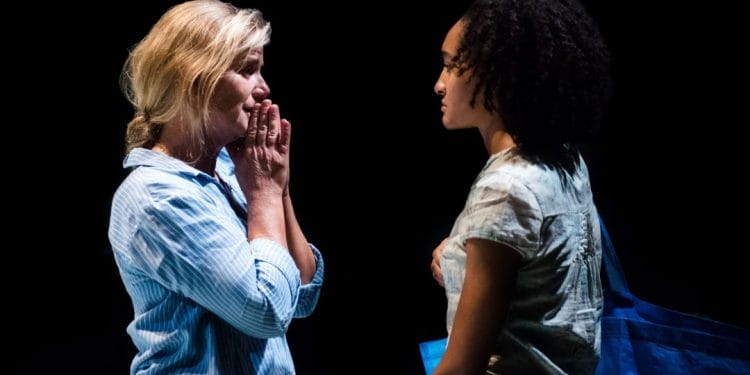 It seems a well-trodden plot can indeed still hold surprises when it’s placed in the hands of the right director and a skillful cast. Joanna Murray Smith’s Honour is revived at the Park Theatre by Tiny Fires and demonstrates how much you can learn about a person when you really get under the skin of their situation.
It seems a well-trodden plot can indeed still hold surprises when it’s placed in the hands of the right director and a skillful cast. Joanna Murray Smith’s Honour is revived at the Park Theatre by Tiny Fires and demonstrates how much you can learn about a person when you really get under the skin of their situation.
There’s no denying it’s a predictable and often used storyline. Honor has dedicated her life to husband George, giving up her own writing career to keep home and raise a daughter, while George pursued an “award-winning” career as a columnist and book critic. But when young and attractive Claudia turns up to write a feature about the ageing writer, Honor is dropped like a hot coal, as George attempts to reignite the passion in his life, he even threatens to buy a yacht – it’s a mid-life crisis twenty years too late.
Murray-Smith’s play is really an interrogation of relationships, and to a certain extent monogamy. This works well in certain scenes; when George announces his intention to leave Honor, the surprise, confusion and shock permeates in to the audience, while the scene between Claudia and Sophie delves deep in to the motivations of both characters.
At other times, the wordiness of Honour begins to pull it down, half way through the second act it becomes clear that everything that needs to be said, has been said, and the often repeated back and forth’s between the characters need to give way to the natural conclusion of the story.
Transposed from 1995 Australia to modern-day London, updates to the script see George lament over the rise of Love Island and comment on online bloggers. It’s a good move, with the plot already playing a familiar tune, the modernised text makes it feel less like a play stuck in the 90’s and more like a commentary on life today.
Presented in the round marks a stark difference to Honour’s last revival under the proscenium arch of the Wyndham’s. Here at The Park, the audience feel like voyeurs, watching and examining the unfolding events from every angle, quite literally. The green marble set sees boxes constantly being moved in an attempt to create various settings, I suspect it says something about the emotional baggage being carried around by each character but ends up being a little too distracting.
Director Paul Robinson has ensured that the cast have the flexibility to make the characters their own. This can perhaps be seen most vividly in Henry Goodman’s George, bumbling and stuttering through his self-justification, but exploding in frustration and anger at all the right moments. The audience often torn between feeling contempt or pity for this rather pathetic figure that Goodman has rather expertly crafted.
In the nearly title role, Imogen Stubbs gives a remarkable performance, at the beginning she portrays the content wife comfortable in her own skin, but with an edge of nervous awkwardness. As the character’s life falls apart, and then begins to be rebuilt, Stubbs navigates the hurdles of emotion turmoil, making it easy for us all to empathise with Honor. She also has the benefit of some wonderful put down’s which are delivered with crushing subtlety.
As Sophie, Natalie Simpson doesn’t get a whole lot of stage time, but she certainly makes her presence felt; throughout her emotionally packed monologue the audience were hanging on her every syllable.
In the role of femme fatale, Claudia, Katie Brayben truly encapsulates every part of the character’s psyche. In her first meeting with Honor, she mirrors her soon to be lovers wife, the crossing of the legs and little gestures serve as a prelude to the cool and calculated path of destruction she’s about to embark upon.
George declares at one point that he doesn’t want his new relationship to be “one more cliché”, a nod to the fact that Honour is in itself one big cliché, but that’s not necessarily a bad thing. When we’ve heard a story so often it’s easy to forget how each of the players find their motivation, Joanna Murray-Smith opens that back up in a devastating exposé of love, life and relationships, delivered by an exceptional cast.

























